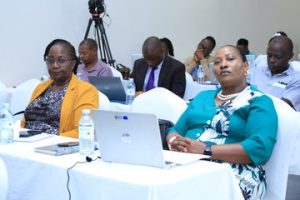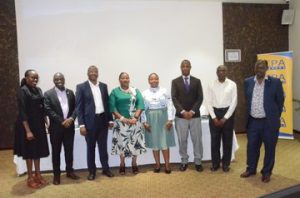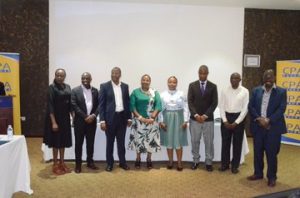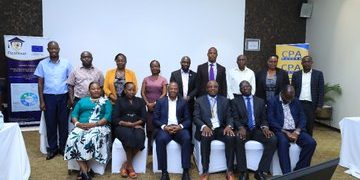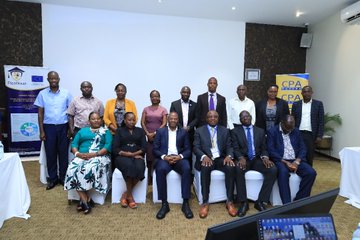The Institute of Certified Public Accountants of Uganda (ICPAU) on Friday convened its inaugural Research Conference at Protea Hotel Skyz in Naguru, marking a historic milestone in elevating evidence-based practice within the accountancy profession.
Opening the conference, Prof. Samuel Kisakye Ssejjaaka, Country Lead at MAT-Abacus Business School, urged accountants to place research at the centre of their professional work.
“This gathering marks history — Uganda’s first-ever ICPAU Research Conference,” he told participants. “Great professions are built on curiosity, scepticism, rigour, and evidence, not opinion. Research is what sharpens the accountant’s voice in public affairs, strengthens assurance work, and prepares us for an era shaped by AI and rapid technological change.”

Prof. Ssejjaaka called on accountants to “lead with evidence-based insights,” emphasising that the profession must “question assumptions, challenge old narratives, and stay adaptable.”
He also took participants through the philosophical foundations of research — ontology, epistemology and axiology — stressing that credible inquiry must be guided by a clear understanding of truth, knowledge and values.
“Methodology is not just a technical step,” he said. “It defines how we investigate, test assumptions, and validate evidence. Credibility comes from rigour and evidence, not opinion.”
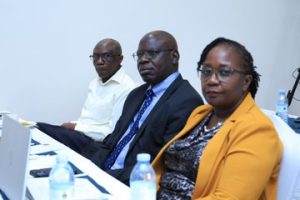
ICPAU Leadership Reaffirms Commitment to Research
Representing the ICPAU President, CPA Alfred Beitwababo Kabuchu, the Institute’s Vice President, applauded the launch of a research-driven trajectory for the profession.
“We are shaping a data-driven, future-ready profession,” he said. “Evidence-based research strengthens accountability, sustainability and professionalism. It guides policy, standard-setting and national development.”
He thanked Council, presenters, reviewers and members “for championing innovation,” adding that ICPAU remains committed to building a resilient and globally competitive profession.
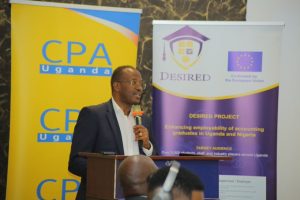
Delivering remarks on behalf of CEO CPA Derick Nkajja, CPA Charles Lutimba described the conference as “the beginning of a new chapter.”
“Research must become central to how accountants think, lead and make decisions,” he said. “Let us use our expertise to generate evidence that strengthens governance, informs policy, and advances the future of our profession.”
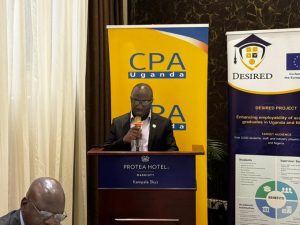
Spotlight on AI, ESG, Tax Policy and Governance
The conference featured several groundbreaking papers addressing emerging trends across the accounting ecosystem.
Ms Zalikah Beatrice Nabateregga, Senior Accountant at NARO, presented research on the impact of Artificial Intelligence on the profession.
“AI brings unprecedented opportunities for accuracy, speed and strategic decision-making,” she noted. “But the greatest transformation lies in how accountants evolve.” She emphasised the shift from routine processing to “insight-driven advisory grounded in analytical skills and digital competence.”
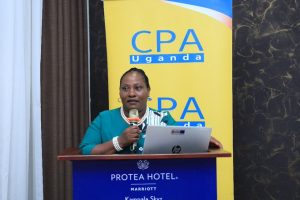
She cautioned that Uganda’s public sector stands “at a pivotal moment,” where readiness, capacity building and ethical frameworks will determine the success of AI integration.
From Makerere University Business School, CPA Sharon Nuwasiima delivered a paper on “The ESG Agenda: Driving Energy Efficiency Across Uganda’s Manufacturing Sector.”
She argued that environmental, social and governance metrics are now essential for competitiveness. “High energy costs and outdated technologies are holding back the sector,” she said. “ESG-driven approaches can significantly enhance efficiency, but long-term gains require better governance incentives and alignment with global sustainability frameworks.”

She noted that the future demands deeper capacity in ESG reporting, sustainable finance and integrated performance measurement, adding that “accountants will play a central role in shaping credible climate disclosures and strengthening governance structures.”
CPA Edson Ashabahebwa, Treasury and Project Finance Manager at the Uganda National Oil Company, presented his paper on “Tax Policy for Africa’s Energy Transition.”
He highlighted the balancing act required in oil-dependent economies. “Fiscal revenues must be safeguarded even as we shift towards cleaner energy,” he said. He emphasised the role of carbon taxes, excise reforms and revenue recycling, noting that “strong institutions and transparent fiscal management” are essential for sustainable transition.

Strengthening Governance in Microfinance Institutions
CPA Dr Dorothy Nseka Kiyaga, Chief Audit Executive at Housing Finance Bank, presented research on the role of internal audit in the governance of regulated non-deposit-taking institutions.
She warned of “significant governance vulnerabilities” within Tier 4 microfinance institutions and argued that an empowered internal audit function could greatly enhance accountability.
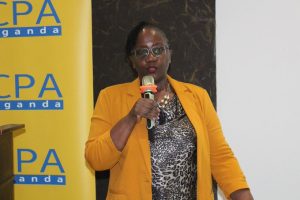
“When internal audit is aligned with regulation and properly resourced, it transforms governance,” she said. Her applied framework demonstrated how auditors can strengthen risk management and institutional resilience.
Advancing ESG Reporting in Uganda
Independent development consultant Mr David Baganda delivered a paper on ESG reporting, highlighting both opportunities and challenges in the Ugandan context.
“Sustainability reporting offers pathways to green finance, competitive advantage and better risk management,” he said. However, he cautioned that capacity gaps, high transition costs and weak enforcement remain major obstacles.
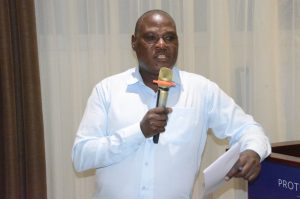
He called for “stronger policy alignment, interdisciplinary training and coordinated national efforts” to support credible ESG reporting, reinforcing the “pivotal role of accountants in driving transparency and sustainability.”
The inaugural ICPAU Research Conference attracted accountants, academics, policymakers, students and industry leaders, all united by a commitment to advancing evidence-based practice.
